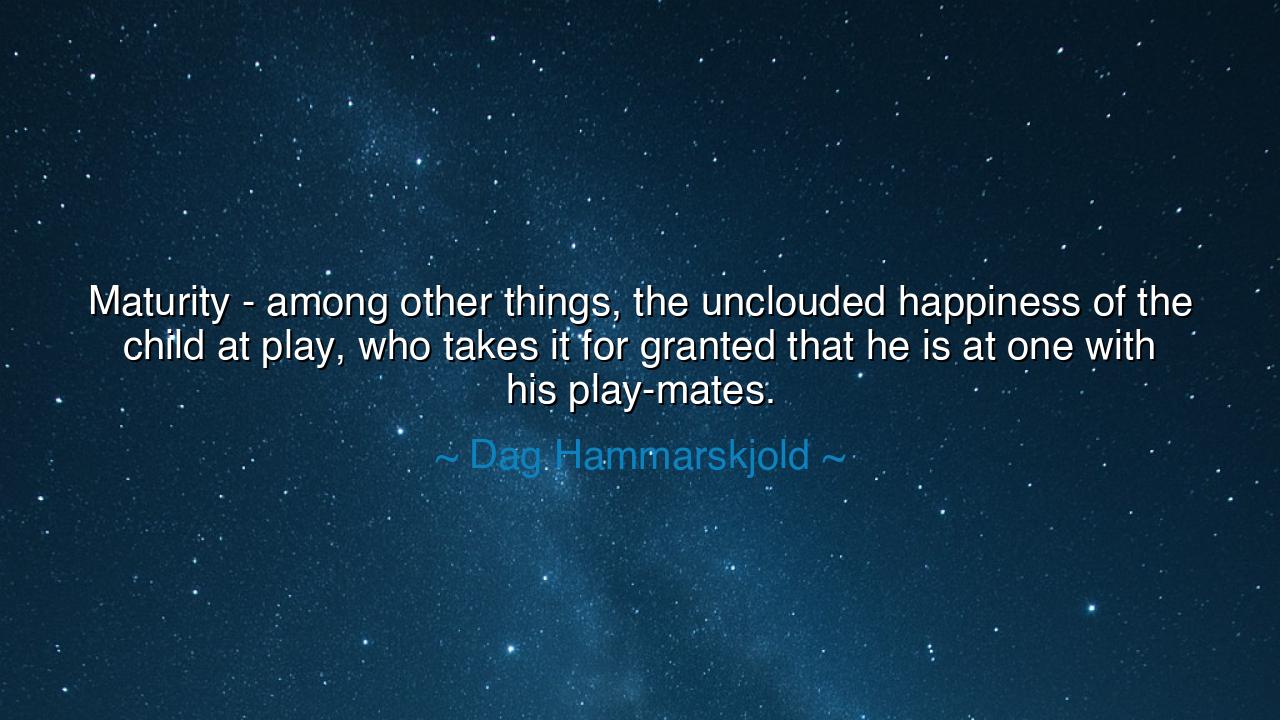
Maturity - among other things, the unclouded happiness of the
Maturity - among other things, the unclouded happiness of the child at play, who takes it for granted that he is at one with his play-mates.






When Dag Hammarskjöld, the Secretary-General of the United Nations and a man of profound moral vision, wrote, “Maturity—among other things, the unclouded happiness of the child at play, who takes it for granted that he is at one with his playmates,” he revealed a paradox at the heart of human growth. In his words, the seasoned diplomat and philosopher speaks of maturity not as the loss of innocence, but as its conscious recovery. He reminds us that to be truly mature is to return—through understanding, humility, and peace—to the radiant simplicity of the child who plays without fear, rivalry, or self-consciousness. Happiness, in its purest form, is not the reward of ambition, but the natural state of the soul when it forgets itself and becomes one with others and with life.
Hammarskjöld, who guided the world through the turmoil of the Cold War, knew well the burdens of duty, the loneliness of leadership, and the constant weight of human conflict. Yet even in that storm, he perceived that wisdom was not cynicism, and maturity was not weariness. He wrote often in his private journal, Markings, about the inward journey of the spirit, the need for purity of heart amid worldly complexity. This quote springs from that inner philosophy. It is a meditation born of solitude—a reminder that the highest strength is not hardness, but harmony; that the greatest wisdom is the ability to love without calculation, as a child does.
In childhood, the heart knows a secret that adults forget: that joy comes from belonging, from the unspoken sense that we are part of something greater than ourselves. When a child plays, he does not question his worth, nor does he measure his success; he is absorbed wholly in the moment, alive in the dance of life. To be at play is to be at peace—to move in the rhythm of creation itself. Maturity, as Hammarskjöld understood it, is the return to that state of unity, but now enriched by awareness. It is the innocence that survives knowledge, the trust that endures despite experience, the love that continues to give even when it has known pain.
We see this truth reflected in the lives of the great and the good. Consider Mahatma Gandhi, who bore the immense weight of a nation’s struggle and yet retained a childlike serenity. His laughter was soft, his eyes gentle; he spoke to the powerful and the poor alike with the same calm joy. Beneath his discipline and resolve was that unclouded happiness which comes only from knowing one’s oneness with others. Gandhi had found, as Hammarskjöld wrote, the maturity that returns to innocence—the soul so purified of pride and fear that it can delight once more in the simple fellowship of humanity.
In our modern world, many mistake maturity for solemnity, and wisdom for cynicism. They grow older but not deeper, gathering knowledge while losing wonder. But Hammarskjöld’s vision reminds us that maturity is not the extinguishing of the child within, but its redemption. To be mature is not to lose joy, but to purify it; not to harden the heart, but to open it more fully. True maturity smiles without arrogance, acts without bitterness, and loves without condition. It is the harmony of strength and innocence, the balance of gravity and grace.
Happiness, then, is not found in escape or in indulgence—it arises when the heart is at one with others, when the self dissolves into communion. The mature soul, like the child at play, finds no division between itself and the world. Whether it works, speaks, or serves, it does so with joy because it feels part of the great design. The wise man does not isolate himself in intellect or ambition; he joins the dance of life, laughing gently at his own smallness and rejoicing in the vastness of creation.
So, my children of thought and striving, take this teaching of Dag Hammarskjöld to heart: seek not a maturity that darkens the spirit, but one that restores its light. Work, struggle, and endure—but do not forget how to play. In your labor, find love; in your service, find joy; in your wisdom, keep wonder alive. For the greatest maturity is to stand in the world as a grown soul with the heart of a child—strong, knowing, and yet unclouded. Then, like the child at play, you shall discover what all sages have sought: the still, bright joy of being at one with life, and through it, with all mankind.






AAdministratorAdministrator
Welcome, honored guests. Please leave a comment, we will respond soon